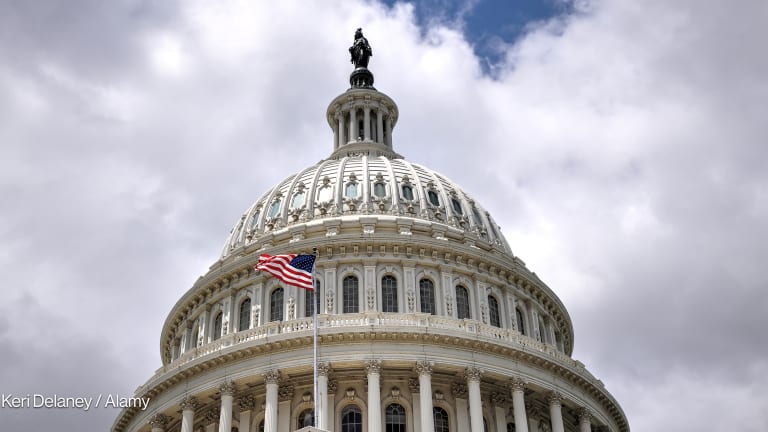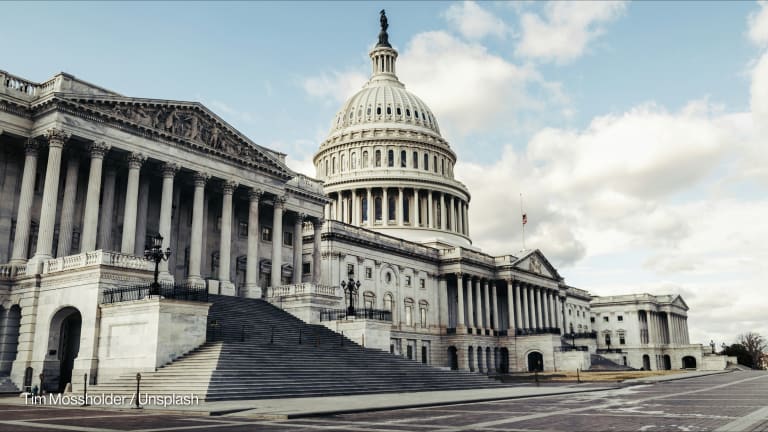
WASHINGTON — The BUILD Act, the bill that would create a new United States development finance corporation, moved closer to passage this week, with the House Foreign Affairs Committee approving the bill with some changes, and the Senate Committee on Foreign Relations holding a hearing to discuss the legislation.
In the markup, members of the committee sought to address some of the concerns about the legislation, including that the new development finance corporation did not have a strong enough development mandate, that it lacked sufficient linkages to the U.S. Agency for International Development, and that its social, human rights, and environmental safeguards, measurement, and transparency were not clearly spelled out. Several of those issues were also raised at the Senate hearing.
See more related topics:
► Opinion: The new US DFI deserves the development community's support. Here's why.
▶ Opinion: What a new US development finance institution needs to succeed
▶ Opinion: The DFI bill is good for American taxpayers, national security, and the world's poorest
▶ Support for new US development finance bill, even as some details are questioned
Members of House Foreign Affairs Committee congratulated one another about the bipartisan nature of the bill. It was approved by the committee, and committee chairman Rep. Ed Royce, from California, will recommend that it is considered under suspension of the rules, which is an expedited process that limits debate in the full House of Representatives, doesn’t allow any further amendments, and requires a two-thirds majority to pass. It is a procedure used to expedite legislation that has bipartisan support.
The rather sparsely attended Senate hearing didn’t have too much controversy either, though Sen. Bob Menendez, a Democrat from New Jersey did push Overseas Private Investment Corp. Chief Executive Officer Ray Washburne on a few issues.
Menendez’s concerns were about the role of USAID, oversight of the agency, ensuring that the new development finance corporation has a strong development motivation, and that USAID continues to lead U.S. development efforts. Menendez said he was disappointed that USAID did not have a witness testifying at the hearing and said that he wants to meet with USAID Administrator Mark Green before moving forward.
The new development finance corporation’s mission needs to have development at its core, and not just function as a bank, he said, but he went on to express his support for OPIC.
Washburne said that the legislation has the full support of the administration, adding that he has worked closely with Green, meeting a few times to discuss the new agency, the chief development officer role, and how the two agencies will work together. Washburne also said that USAID employees in missions around the world will be “boots on the ground” for the new DFC and that the expansion of the DFC would give field officers more tools to meet their objectives, which he described as a “huge benefit.”
Menendez also pushed Washburne to discuss how OPIC currently defines highly developmental projects and what processes or standards are in place. Washburne answered that OPIC has a development matrix it uses to evaluate projects, adding that he would share it with the committee.
Menendez also raised questions about the bill removing the requirement for investments to have a U.S. nexus, which were answered best by other witnesses who testified about the need for that flexibility, particularly if the new DFC is to do more work in fragile states, where often U.S. investors, or U.S. businesses are unwilling to operate.
“The most important social program is a job,” said Dan Runde, the director of the Project on Prosperity and Development at the Center for Strategic and International Studies at the hearing, adding that broad-based economic growth in the toughest places should be exactly where the new DFC is working, even if those investments don’t make a full market return — that will mean working with companies without ties to the U.S. in some cases.
Runde also offered up some improvements to the bill as it moves forward in the process, including improving linkages with USAID to help USAID employees be aware of all the tools available and so it can work with countries and regulators to create an environment for investment. Runde suggested that the head of the Development Credit Authority, which currently sits at USAID but would move to the new DFC if the bill is passed, would be “dual-hatted” and have accountability to USAID and the DFC. He also recommended having investment officers for the new DFC based overseas, as part of USAID mission teams.
George Ingram, a senior fellow at the Brookings Institution, offered up a few suggestions in his testimony at the hearing as well, such as improving the development mandate, and including language on transparency requiring data be publicly available on a project basis in a comprehensive way, as part of the Foreign Aid Transparency and Accountability Act. Ingram also recommended that the statue mandate the new DFC to follow International Finance Corporation guidelines and performance standards on environmental and social sustainability, including on human rights and workers’ rights.
Some of those recommendations are incorporated in the new version of the House bill that was approved with amendments Wednesday. The new version of the bill has added more language about development and, in several places, language was added to require the new DFC to consult with USAID before making certain decisions and work with them in a number of areas, including technical assistance. The changes to the legislation include:
Mandating that the new DFC have a chief development officer, rather than just suggesting it, giving the USAID administrator a role in selecting someone for the role, and spelling out what the position will entail — namely coordinating the DFC’s development policies and implementation efforts with USAID, the Millennium Challenge Corporation, and other government agencies, and working with USAID missions.
New language added about the purpose of the DFC: “To provide countries a robust alternative to state-directed investments by authoritarian governments and United States strategic competitors using high standards of transparency, environmental and social safeguards, and which take into account the debt sustainability of partner countries.”
Changes to language about the board of directors, including some procedural changes related to the appointment process and quorum. It also changed language requiring board members to have private sector experience, instead requiring them to have relevant expertise in the private sector, environment, labor organizations or international development. The bill also now requires the board to develop, “in consultation with stakeholders and other interested parties, a publicly-available policy with respect to consultations, hearings, and other forms of engagement in order to provide for meaningful public participation in the Board’s activities.”
An amendment from Rep. Connolly, a Democrat from Virginia, adjusted the performance measures section, adding that the corporation should “develop standards for, and a method of ensuring” development performance, both before the DFC enters into a project and after it has been completed.
An amendment from Rep. Bill Keating, a Democrat from Massachusetts, requiring that the new DFC have a transparent and independent accountability mechanism that will evaluate the agency’s compliance on environmental, social, labor, human rights, and transparency standards annually, provide a forum for resolving concerns about specific projects, and provide advice about projects.
An amendment from Rep. Lois Frankel, a Democrat from Florida, adding language to the bill encouraging the new DFC to carry out gender-disaggregated measurement of development outcomes “to the extent practicable,” and added that the DFC should consider the impacts of its works on women’s economic opportunities and work to mitigate gender gaps.
Language requiring the corporation to develop a successor for the development impact measurement system OPIC uses and develop a mechanism for ensuring that support is in addition to private investment.
A longer workers’ rights section that says the new DFC should support projects in countries that are taking steps to adopt and implement laws related to workers’ rights and requires the DFC to include language in every contract that says the investor agrees not to take actions to prevent employees from exercising their right to association and bargain collectively, and agrees to observe laws around minimum ages of employment, acceptable work conditions including minimum wages, hours of work and safety and that the investor will not use forced labor or child labor.
Royce, the Republican from California, included a new provision to give preference to countries where the governments are “making continual progress toward economic policies that promote the development of private enterprise.”
Tweaks around investments in local currency — requiring some justification — and the cap on total equity investments — which was raised. Additional prohibitions about working with corrupt organizations, foreign boycotts, and not supporting sanctioned parties were also included.








